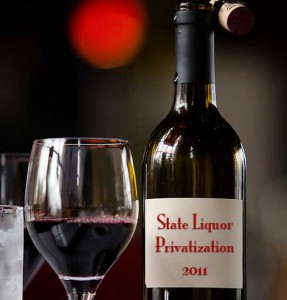State Rep. cautions that state spending cuts could be wide, supports privatizing liquor stores & more efficient government

While supportive of privatizing the state liquor stores, State Rep. Chris Ross cautions that it might not be as lucrative as some thing and may be a complicated process.
By Mike McGann, Editor, UnionvilleTimes.com
There are times that less is more, and one local state legislator is hoping that the state’s financial crisis will offer an opportunity to makes things less complicated — and expensive — for local governments and school districts.
State Rep. Chris Ross (R-158) said he thinks that could be one approach to helping both the state and local school districts and governments get through what looks to be a difficult couple of years is to find ways to cut regulations and requirements that often hamstring lower levels of government, while wasting money on the state level to ensure compliance.
While acknowledging more stripped-down and efficient government won’t solve the entire looming state fiscal crisis — estimated at between $4 and $5 billion — simplifying regulations and requirements on local government could save money up and down the government food chain and lead to more effective government.
“We have to do what can do to make things cheaper,” Ross said of regulations regarding county, municipal and school district interactions with the state and its government and agencies. “I think we have an opportunity to reduce government and make it a bit more efficient.”
Ross said the impetus for this came out of discussions with the West Chester Area School District, with board directors asking for relief from some of the, at times, frustrating and even contradictory, state regulations that districts must cope with in dealing with the state. In addition to saving local governments money, the state should see some savings if it has less rules and regulations to administrate and enforce.
Still, while a streamlined government would likely improve government and cut some costs, Ross said he knows that fairly wide-spread cuts are going to be in state spending, to get the budget down to the approximately $24 billion dollars anticipated to raised by the state in the 2011 fiscal year — down from more than $28 billion spent in 2010.
“I’m not going to pretend that this is going to be painless,” Ross said. “There are going to have to be some wider ranging cuts to a number of state programs.”
Already in place are hiring freezes and pay freezes. At minimum, state employees are probably going to be asked to accept lower benefits and salaries in an effort to minimize layoffs.
Although the numbers are stark, most members of the legislature are awaiting the budget of new Gov. Tom Corbett, waiting for him to signal his budget priorities and make his case on where the cuts should be made. As that budget proposal isn’t expected until early March, legislators like Ross have little to go on right now in terms of the general direction of the budget process.
Ross said he expects to support the new governor’s budget plan, assuming it truly provides for a balanced budget, seemingly making a veiled reference to former Gov. Ed Rendell’s 2010 budget which was dependent on federal funds not approved when the budget was presented to the legislature and ultimately only partially approved — a budget heavily criticized by various members of the state GOP, although a compromise version passed the legislature by a fairly large margin.
The eight-term state representative said he thinks the cuts will be fairly broad-based and that some of the proposals floating around, such as privatizing the state liquor stores, while helpful, won’t solve the shortfall. While supporters argue that the sale of the stores could net as much as $2 billion, Ross said he isn’t sure it will prove to be quite as lucrative as some might suggest, but thinks its long overdue for the state to get out of the liquor business.
A long time supporter of the idea, Ross says he wants to be realistic about how much fiscal impact the move will have on the state’s bottom line — or how complicated it will be to try and change the system. He said he is more optimistic about the chances of getting something done after previous efforts failed, as both the economic situation and that there might be less opposition from cultural conservatives worried that private liquor stores would mean more consumption of alcohol.
What format the store end up using — would privatization just mean selling the existing stores to private firms, or would it mean offering up licenses for various types and styles of outlets as seen in neighboring states? While there is general support the concept of privatization — except possibly from organized labor, seeking to protect thousands of union jobs in the existing state stores — it’s less clear what the final version of private liquor stores will look like.
“There are hugely different kinds of stores out there,” he said.
[Editor’s note] We’ll have more from Rep. Ross later this week, as he speaks about some of this other priorities for 2011, including school funding re-balancing, fixing some state regulations that may be causing the reverse of the planned effect and a his thoughts on the redistricting process.







